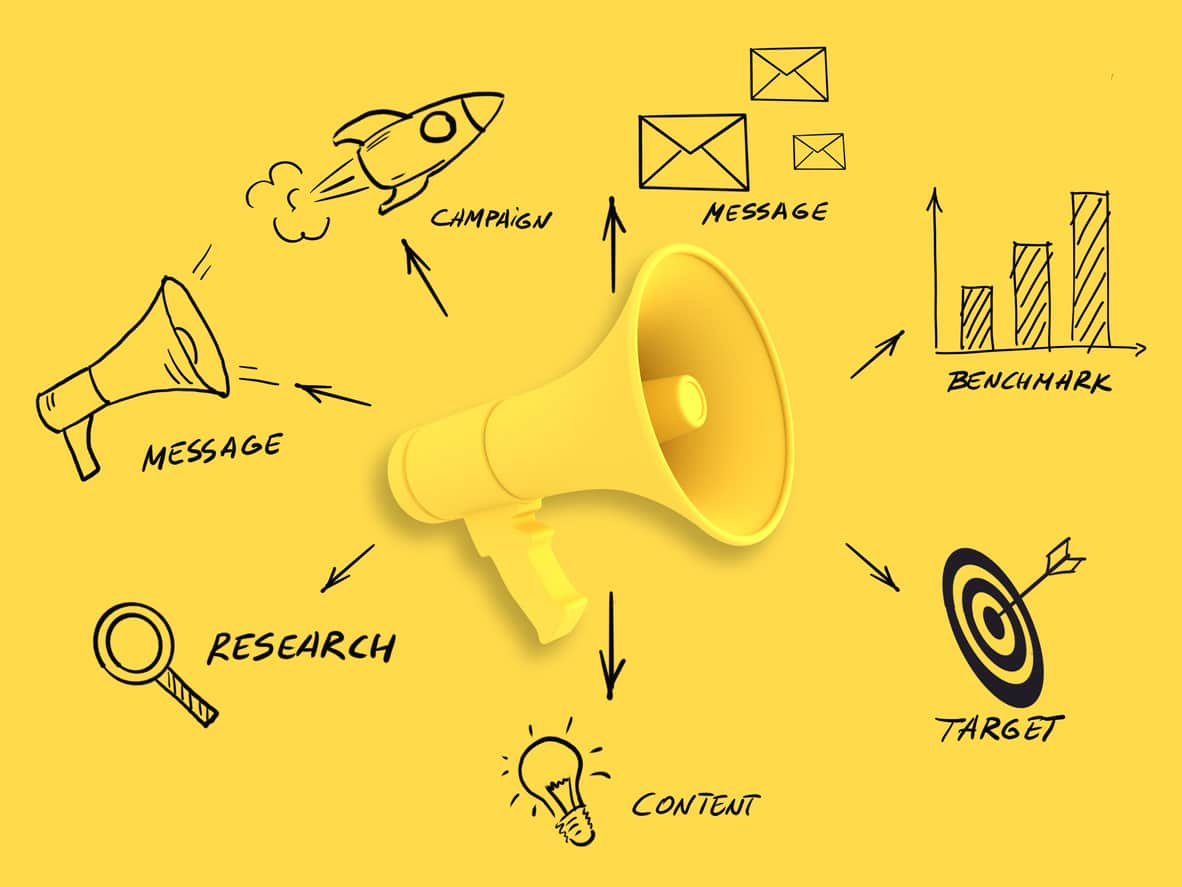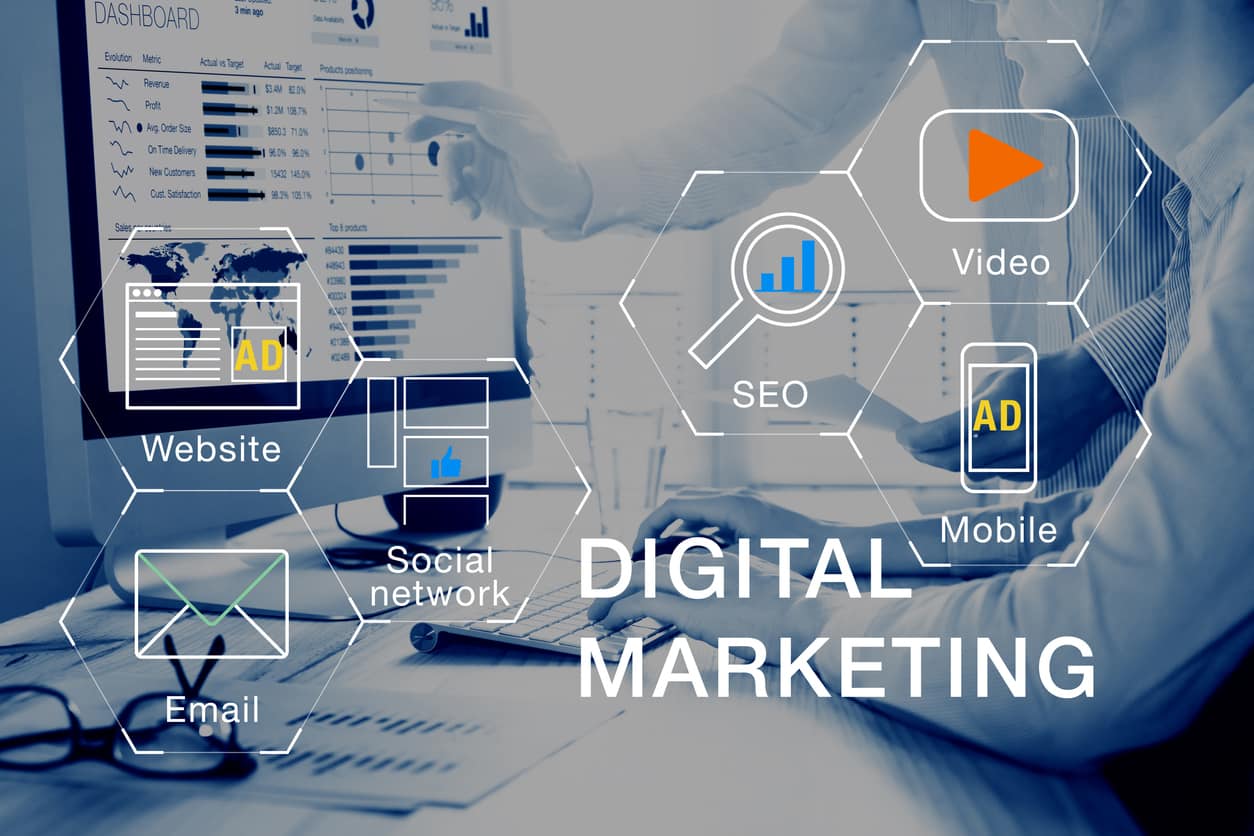- Some Facts on Digital Marketing
- What is Digital Marketing?
- Importance and Benefits of Digital Marketing
- Types of Digital Marketing
- How to develop Digital Marketing Strategy?
- B2B versus B2C Digital Marketing
- Digital Marketing Tools and Channels
- Role and Skills of a Digital Marketer
- Digital Marketing Challenges
- Key Performance Indicators (KPI) in Digital Marketing
- Conclusion
- Frequently Asked Questions
Digital marketing is the use of digital technologies and platforms to promote products and services, as well as to connect with potential customers. It is an incredibly versatile and powerful tool that can be used in various ways to reach people worldwide. Digital marketing utilizes multiple digital technologies to deliver promotional messages, such as mobile phones, computers, and other digital media and platforms. It can be used for B2B (Business to Business) and B2C (Business to Consumer) marketing, depending on the goal and objectives of the campaign. Digital marketing offers unique advantages such as greater reach, improved targeting, personalized messaging, and better ROI (Return on Investment). It also allows businesses to stay up-to-date with marketing trends and technologies. With the right strategies and tactics, companies can leverage digital marketing to increase their visibility and reach a larger audience.
Some Facts on Digital Marketing
Digital marketing has become a popular way of reaching out to potential customers, as it is efficient, cost-effective and provides more control over the targeting of advertisements. Digital marketing channels such as search engine optimization (SEO), pay-per-click (PPC), social media marketing (SMM) and email marketing are used to create and deliver marketing messages, as well as measure the success of campaigns.
Some key facts on digital marketing include the following:
- Compared to $491.70 billion in 2021, the amount spent on digital advertising in 2022 increased by 16.2%.
- Organic search is the most popular form of digital media, accounting for 34% of all online traffic.
- Companies are expected to invest an average of 9% of their total marketing budget in digital channels.
- Mobile advertising will account for over half of all digital ad spending this year.
- Email campaigns have an average return on investment (ROI) of $44 for every dollar spent.
- Video content is growing faster than any other type of online content, with 87% of marketers using video content in their campaigns.
- Digital marketing campaigns can be tracked, measured, and optimized at any time, allowing marketers to adjust strategies as needed.
What is Digital Marketing?
Digital marketing is the act of promoting products and services through digital channels, such as social media, SEO, email, and mobile. It is a form of marketing that helps businesses to reach their target audiences, build relationships, and boost sales through digital channels. Digital marketing utilizes a combination of tools such as analytics, social media, content marketing, search engine optimization (SEO), search engine marketing (SEM), email marketing, mobile marketing, and more to create an effective digital presence.
Digital marketing is a powerful way for businesses to reach their target customers and engage with them in meaningful ways. It enables businesses to create personalised messages for their customers, increasing the likelihood of message recall and purchase intent. Additionally, businesses can leverage digital channels to track customer behaviour and identify areas of opportunity. By using digital analytics and other data-driven techniques, marketers can better understand their customers’ needs and preferences and tailor their offerings accordingly. Digital marketing also gives businesses access to a larger audience than traditional marketing channels due to its ability to reach people across the globe.
From creating engaging content to delivering targeted ads with precision, digital marketing is an essential tool for driving business growth and success. It offers businesses the opportunity to reach a large audience in efficient ways while providing customers with personalized messages that build long-lasting relationships.
Importance and Benefits of Digital Marketing
Digital marketing is an important component of any successful business strategy. It allows companies to reach a wider audience and create a personalized connection with customers. It also provides businesses with an opportunity to engage with customers on a more personal level, creating a sense of trust and loyalty. Additionally, digital marketing gives businesses access to real-time analytics, enabling them to make informed decisions and track the success of their campaigns. The benefits of digital marketing include increased brand awareness, improved customer engagement, lower marketing costs, increased customer loyalty, and higher ROI. Furthermore, digital marketing can potentially increase sales and profits, as well as build lasting relationships with customers. By leveraging the power of digital marketing, businesses can effectively reach their target audience and drive growth.
Types of Digital Marketing
Digital marketing can take many forms:
- Search engine optimization (SEO): This entails increasing a website’s presence on search engine results pages. (SERPs).
- Search engine marketing (SEM): To do this, paid advertising must be used in the search engine results pages.
- Content marketing: To attract and keep a clearly defined audience, this entails producing and distributing valuable, pertinent, and consistent information.
- Social media marketing: This entails utilizing social media websites to interact with clients and advertise a company.
- Email marketing: This involves using email to send marketing messages to customers and potential customers.
- Mobile marketing: This involves using mobile apps, SMS, and other mobile channels to reach customers.
- Marketing automation: This involves using software, including AI marketing tools, to automate marketing processes such as email campaigns and social media posts.
- Influencer marketing: This involves collaborating with influencers, or people with a large following on social media, to promote a business.
- Video marketing: This involves using video content to promote a business, such as through YouTube or social media.
- Affiliate marketing: This involves using affiliates, or people who promote a business’s products in exchange for a commission, to reach new customers.
Each type of digital marketing has its own advantages and disadvantages, so it’s important to choose the one that’s best for your business.
How to develop Digital Marketing Strategy?
Developing a digital marketing strategy is a critical part of any successful business. It involves research, planning, and execution to ensure that your digital marketing efforts effectively achieve your desired objectives. A well-planned digital marketing strategy can help you to reach your target audience, increase brand awareness and drive more sales.
When creating a digital marketing strategy, it is important to consider the following steps:
- Define Your Objectives – The first step in creating an effective digital marketing strategy is to define your objectives. Identify the goals you want to achieve and decide on the metrics you will use to measure success.
- Identify Your Target Audience – Knowing who you are targeting with your digital marketing efforts is essential. Research your target audience and create buyer personas to understand better who they are and what they need.
- Choose Your Digital Channels – Different channels offer different benefits and it’s important to understand which ones will be most effective for your digital marketing strategy. Consider social media platforms, search engine optimization (SEO), email campaigns, video content, and other methods of reaching your target audience.
- Develop Your Content Strategy – Content is an important part of any successful digital marketing strategy. Develop a content plan that includes different types of content, such as blog posts, videos, infographics, and more.
- Monitor and Analyze Results – Once you have implemented your digital marketing
B2B versus B2C Digital Marketing
Business to business (B2B) digital marketing is different from business to consumer (B2C) digital marketing. B2B digital marketing focuses on connecting businesses with other businesses while B2C marketing focuses on connecting a business with individual consumers.
B2B digital marketing has a few key differences compared to B2C digital marketing. These differences include the target audience, the value of the product, the sales cycle and the digital marketing channels used.
For B2B digital marketing, the target audience is other businesses, corporate decision-makers and professionals. This means that the content and messaging used in B2B digital marketing must be more tailored and focused on providing value to the target audience.
The product value for B2B is also different from that of B2C. B2B products are more expensive and complex, require more research and consideration before purchase. The sales cycle is also much longer for B2B products than for B2C products.
In terms of digital marketing channels, B2B marketers tend to focus more on professional networks like LinkedIn, trade publications, and industry events. On the other hand, B2C marketers tend to focus more on social media channels like Facebook and Instagram.
Digital Marketing Tools and Channels
Digital marketing covers a wide range of activities, and as such there are a variety of digital marketing tools available to help you to reach your goals. From email and social media marketing to paid search, display advertising, and more, there are a variety of digital channels that can be used to help you reach your target audience. It’s important to understand the different types of digital tools and channels in order to develop an effective digital marketing strategy.
Email marketing is one of the oldest forms of digital marketing, and it involves sending emails to customers with the goal of driving engagement and sales. Email campaigns can be used to nurture leads, acquire customers, and increase brand awareness. Social media is another powerful tool for digital marketers, allowing them to reach their target audiences with engaging content, drive traffic to their websites, and build relationships with their customers. Paid search and display advertising are also effective digital marketing tools for helping businesses to reach their target audiences with relevant messages and offers.
Content marketing is another important part of digital marketing, and it involves creating content that is valuable, entertaining or educational in order to engage customers and build relationships. Content can be created in the form of blogs, videos, infographics, e-books, webinars and more. SEO (search engine optimization) is also key in digital marketing as it helps businesses to appear higher in search engine results pages when potential customers are searching for relevant terms. Finally, online public relations can be an effective tool for.
Role and Skills of a Digital Marketer
Digital marketing requires the use of a wide range of skills and knowledge in order to be successful. A digital marketer should have excellent communication, creative, strategic, analytical, and technical skills. They need to be able to develop compelling content, create campaigns that capture the attention of their target audience, and measure the success of their efforts.
A digital marketer should also be familiar with the various tools and channels available for digital marketing, such as SEO/SEM, email marketing, social media, and other digital platforms. Having an understanding of the fundamentals of coding and web development will also be helpful in creating effective campaigns. They need to stay up-to-date on the latest trends in digital marketing and have the ability to think outside the box when developing strategies. Additionally, it is important to have strong customer service skills in order to ensure customer satisfaction.
Digital Marketing Challenges
Digital marketing is not without its challenges. As a digital marketer, you need to be aware of the potential pitfalls that can arise in your campaigns and be prepared to address them. Some of the most common digital marketing challenges include:
1. Keeping Up with Technology: Digital marketing is constantly evolving, with new technologies and platforms emerging all the time. It can be difficult to stay up to date on the latest trends and make sure your campaigns are optimized for the best performance.
2. Reaching Your Audience: Knowing who your target audience is and how to reach them can be a challenge in itself. You need to know where your audience is online, what platforms they are using, and how to effectively engage them with your content or message.
3. Measuring ROI: Digital marketing campaigns are often difficult to measure in terms of return on investment (ROI). This can make it difficult to determine which campaigns are working and which ones need to be improved or changed.
4. Managing Multiple Channels: Managing multiple digital marketing channels at once can be a challenge for marketers. It requires a lot of time and effort to make sure all channels are properly managed and updated with fresh content or messages.
5. Adapting Quickly: Digital marketing trends move quickly, so you need to be able to adapt quickly in order to stay ahead of the competition.
Key Performance Indicators (KPI) in Digital Marketing
Key Performance Indicators (KPIs) are metrics that businesses use to measure the success of their digital marketing activities. These indicators help to identify which areas need improvement and how to measure the effectiveness of digital marketing efforts. KPIs can include website traffic, social media engagement, conversion rates, customer satisfaction, ROI, and more. By monitoring KPIs, businesses can better understand how digital marketing is performing and make informed decisions when it comes to improving their digital marketing strategies.
If you are interested in learning more about digital marketing, enroll in our Free Digital Marketing Course.
Conclusion
Digital marketing is an ever-evolving and dynamic field of marketing. As technology advances and marketing tools become more sophisticated, the need for digital marketers to stay ahead of the curve is essential. Understanding the importance of digital marketing, its various types and tools, as well as how to develop a successful digital marketing strategy, will help any business or organization reach their goals. Digital marketing is not just about creating content, but also about understanding the customer journey and developing a plan that will be effective in reaching the target audience. In order to be successful, digital marketers must remain agile and stay up to date with the latest trends and changes in the field.
For a flexible learning experience, visit our free online courses. Learn anytime, anywhere.
Frequently Asked Questions
Digital marketing is a form of advertising that uses digital technology, such as the internet, mobile phones, and other digital media platforms to reach customers.
Digital marketing can be a daunting task to tackle, especially if you are just starting out. It requires a lot of hard work, dedication, and knowledge of the various strategies and channels that make up digital marketing. With the right guidance and resources, however, digital marketing can be an incredibly powerful tool that can help you grow your business.
Digital marketing involves the use of a variety of channels to reach your target audience. Some of the most effective digital marketing channels include search engine optimization (SEO), content marketing, social media marketing, email marketing, display advertising, and influencer marketing.
When it comes to measuring the success of your digital marketing campaigns, you need to be able to track and analyze the data. A few key metrics are important for tracking the effectiveness of your campaigns, such as website traffic, conversions, sales, email open rates, and social media interactions.
The key to improving your digital marketing skills is to keep up with the ever-evolving digital landscape. With the pace of change constantly accelerating, it’s important to stay ahead of the game by learning new tactics and strategies. You should also make sure to stay up-to-date with the latest trends and technologies.






